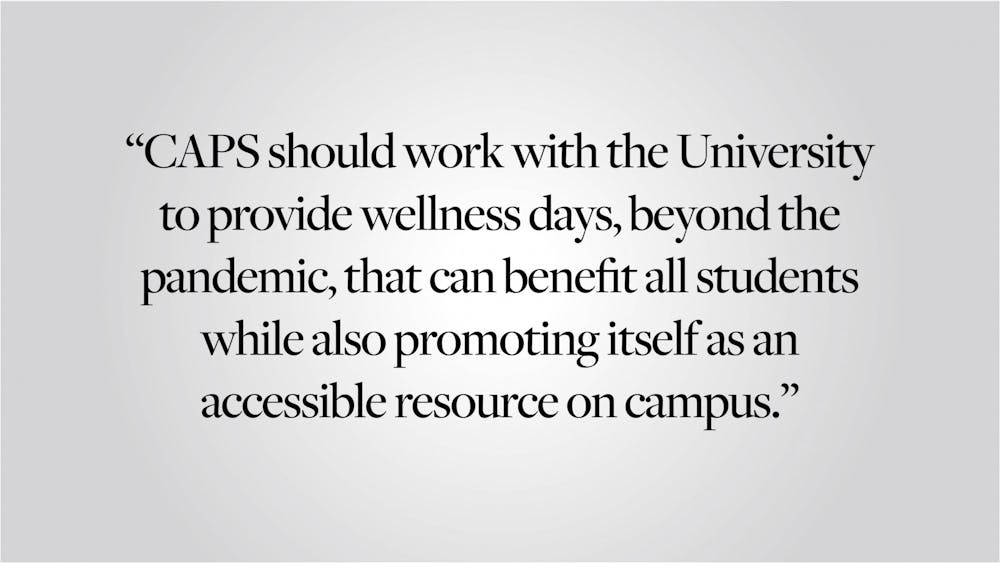After two semesters of slogging through online courses, students are finally returning to in-person University operations. But the mental strain from the pandemic continues to weigh us down. Since last spring, students have been expressing their exhaustion from condensed semesters and challenges posed by the pandemic. As a member of the class of 2024, I share the pervasive feelings of burnout with my peers as we trudge through three consecutive terms. While the University has put Counseling and Psychological Services forth as an available resource for students, frustrations about CAPS still abound.
Since 2017, CAPS has been trying to reach more students since it adopted a new model of care, establishing various workshops and training programs that are open to the entire Brown community. Under this new model, CAPS also shortened the wait time for a first appointment from more than two weeks to one day — which is significantly shorter than the national average of six business days, according to an annual survey from the Association for University and College Counseling Center Directors.
But despite this response rate, CAPS, like most mental health services across the country, largely operates passively in response to student mental health crises rather than actively mitigating the buildup to a crisis. CAPS only becomes active after a student has been struggling with mental health issues long enough to realize they need help and work up the courage to reach out. Instead, CAPS should try to meet students earlier by hosting wellness days and making its website more friendly to those who have little experience with mental health services.
Wellness days are a few scheduled days per semester when all members of a university take a break from their obligations to concentrate on their mental health. During the pandemic, many universities added wellness days to their academic calendars with the goal of alleviating student stress. These schools include, but are not limited to, Boston University, Duke University, Pennsylvania State University and the University of North Carolina at Chapel Hill. CAPS should work with the University to provide wellness days, beyond the pandemic, that can benefit all students while also promoting itself as an accessible resource on campus.
Of course, a few single-day breaks cannot fundamentally reduce the numerous stressors that students face, but it can be a safety net that mitigates complete burnout. Through wellness days, the University can encourage students to be more intentional with their days off. By including them as official breaks in the calendar, the University can demonstrate its support of long-term well-being over immediate productivity, opening the door to more discussions about mental health and student well-being.
Besides providing mental health days, CAPS can also welcome more students to reach out by providing more detailed information on the website. Currently, the website has vague and scattered information about its services in FAQ format, and it can feel like CAPS operates on the assumption that students come in with an understanding of or prior experience with mental health support. The website provides little information on when a student should reach out for help, what they should expect at a counseling session or what a call to CAPS after hours or in an emergency would lead them to. While providing detailed information for individual counseling sessions may be challenging, more relevant information can be extremely reassuring for students who may be feeling anxious about seeing a mental health professional, perhaps for the first time.
For example, the GYN visits page by BWell at Brown, also in FAQ format, acknowledges the possible feelings of stigma and anxiety surrounding their services by providing understanding, informative answers. The page thoroughly walks the reader through common questions like “What can I expect at a GYN visit?” “How long does it take?” and — perhaps most importantly for nervous patients — “What if I am still afraid to have the visit?” In responding to these concerns, the BWell website uses empathetic language like “If, after reading this page, you still have concerns about the GYN visit and are nervous or unsure, that’s OK … your provider can work with you to tailor the exam to help you feel as comfortable as possible.” Adjustments like these, although seemingly minor, can be crucial in a student’s decision to reach out to CAPS.
As the CAPS website reads, its mission is to “assist students with completion of their academic program, engagement in their social and extracurricular activities and development of optimal well-being.” CAPS is a service for all students. In order to fulfill its mission, it must more proactively reach out to all those it’s meant to serve.
Joyce Gao ’24 can be reached at xing_gao@brown.edu. Please send responses to this opinion to letters@browndailyherald.com and op-eds to opinions@browndailyherald.com.





